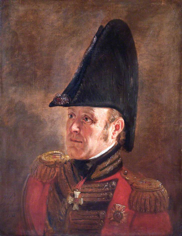Regency Personalities Series-General Sir George Cooke
Regency Personalities Series
In my attempts to provide us with the details of the Regency, today I continue with one of the��many period notables.
General Sir George Cooke
1768 – 3 February 1837
General Sir George Cooke
He was the son and heir of George John Cooke of Harefield, Middlesex, grandson of George Cooke, and great-grandson of Sir George Cooke of Harefield, prothonotary of the court of common pleas. His sister Penelope Anne married Robert Brudenell, sixth earl of Cardigan, and was the mother of James Thomas Brudenell, seventh earl.
Cooke was educated at Harrow, and at Caen in Normandy. He was appointed ensign in the 10th foot guards in 1784 and lieutenant and captain in 1792. In March 1794 he joined the flank battalion of the guards in Flanders, and in June was appointed aide-de-camp to Major-general (Sir) Samuel Hulse.
He was present when the combined armies took the field and attacked the French posts in April; in the actions of 17 and 18 May, and at the affair at Boxtel on 15 Sept. In 1795 he joined the brigade of guards at Darley camp and became aide-de-camp to Major-general Edmund Stevens. In 1798 he was promoted to be captain and lieutenant-colonel in his regiment, and in August 1799 he went with it to Holland. He was present in the action at the Zuype on 10 Sept., and in the battle on 19 Sept., when he was severely wounded.
From 1803 until the spring of 1805 he held the post of assistant adjutant-general to the north-west district. In 1806 he went to Sicily, returning to England in December 1807. On 25 April 1808 he received the brevet rank of colonel, and in July 1809 he was employed in the expedition to the Schelde, whence he returned sick in September.
In April 1811 he went to Cadiz, and on 4 June attained the rank of major-general and succeeded to the command of the troops stationed there, which he retained until his return to England in July 1813. In November he went to Holland with the brigade of guards. He commanded the first division of the guards at Waterloo, and lost his right arm in the battle. He was appointed K.C.B. on 22 June 1815, and colonel of the 77th foot on the following day. He also received for his share in the engagement the insignia of the third class of the order of St. George of Russia and of the third class of the order of Wilhelm of the Netherlands.
On 20 Oct. 1819 he was appointed lieutenant-governor of Portsmouth, a post which he resigned a few years later. On 19 July 1821 he obtained the rank of lieutenant-general, and on 23 Dec. 1834 he was transferred to the command of the 40th regiment.
He died, unmarried, in Harefield Park, 3 February 1837.
And Coming on April 1st, 2015
Beaux Ballrooms and Battles anthology, celebrating the 200th anniversary of the victory at Waterloo in story.

Looks good, huh? The talented writer and digital artist, Aileen Fish created this.
It will be available digitally for $.99 and then after a short period of time sell for the regular price of $4.99
The Trade Paperback version will sell for $12.99

My story in the anthology is entitled: Not a Close Run Thing at All, which of course is a play on the famous misquote attributed to Arthur Wellesley, ���a damn close-run thing��� which really was ���It has been a damned nice thing ��� the nearest run thing you ever saw in your life.���
Samantha, Lady Worcester had thought love was over for her, much like the war should have been. The Bastille had fallen shortly after she had been born. Her entire life the French and their Revolution had affected her and all whom she knew. Even to having determined who she married, though her husband now had been dead and buried these eight years.
Yet now Robert Barnes, a major-general in command of one of Wellington���s brigades, had appeared before her, years since he had been forgotten and dismissed. The man she had once loved, but because he had only been a captain with no fortune, her father had shown him the door.
With a battle at hand, she could not let down the defenses that surrounded her heart. Could she?
As her father���s hostess, she had travelled with him to Brussels where he served with the British delegation. Duty had taken her that night to the Duchess of Richmond���s ball. The last man she ever expected to see was Robert, who as a young captain of few prospects, had offered for her, only to be turned out by her father so that she could make an alliance with a much older, and better positioned (wealthy), aristocrat.Now, their forces were sure to engage Napoleon and the resurgent Grande Arm��e. Meeting Robert again just before he was to be pulled into such a horrific maelstrom surely was Fate���s cruelest trick ever. A fate her heart could not possibly withstand.





